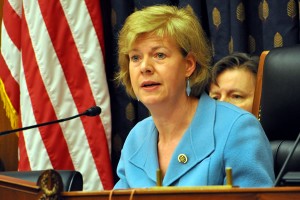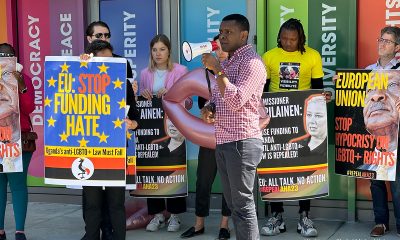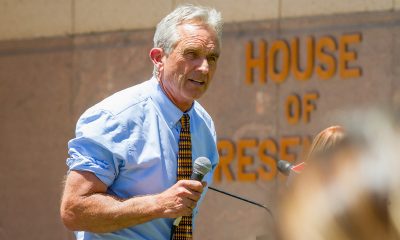National
U.S. commission considers ways to stop anti-gay Uganda bill
Greater involvement from first lady Michelle Obama was one option discussed during a recent congressional hearing as a way for the U.S. to help derail a harshly anti-gay bill in Uganda from becoming law.
Cary Alan Johnson, executive director of the International Gay & Lesbian Human Rights Commission, was among the people who testified before the Tom Lantos Human Rights Commission on Thursday that Obama’s work against the international HIV/AIDS epidemic would make her a strong voice against the bill.
Johnson said the women’s caucus in the Ugandan parliament is supporting the legislation and opposition from the first lady — as well as President Obama — could influence women’s groups in Uganda to drop their support.
“I’m wondering if there is women leaders within the U.S. Congress — and perhaps the first lady herself — might be able to play some role in having discussions about the potential impact of this bill — not just on human rights, but on HIV prevention within the country,” Johnson said.
Julius Kaggwa, a leader of the Civil Society Coalition on Human Rights & Constitutional Law who came from Uganda to testify on the legislation, also said greater involvement from President Obama and Michelle Obama would be helpful in efforts to stop the bill.
“If President Obama and the first lady of the United States can engage more with our first family — especially in the area of HIV/AIDS, which is of great concern to us as sexual minorities — and the issue of human rights generally, I think that would be very, very helpful,” he said.
A stronger voice from the first lady and President Obama was one among several options considered to stop the anti-gay legislation that’s been pending the Uganda parliament since October.
Homosexual acts are already illegal in Uganda, but the bill would, among other things, institute the death penalty for repeat offenders of the homosexual acts ban and for those who have homosexual sex while HIV positive. The harsh penalties for LGBT people in the legislation have inspired growing outrage and concern around the world, including LGBT activists in the U.S.
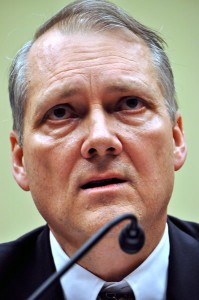
Karl Wycoff, deputy assistant secretary of state for East African Affairs (DC Agenda photo by Michael Key)
Karl Wycoff, deputy assistant secretary of state for East African Affairs, testified that the State Department has been working to prevent the bill from being enacted into law even as the U.S. considers the country an ally.
“The introduction of this anti-homosexuality bill in Uganda characterizes just such a moment — one where we must say to our friends who’s friendship we value that together we must stand against injustice, and in this case, injustice against the LGBT community,” he said.
Wycoff noted how the White House in January issued a statement in opposition to the legislation and said Secretary of State Hillary Clinton has expressed concerns about the bill with Ugandan President Yoweri Museveni in addition to publicly opposing the legislation in two speeches.
“Our embassy … has been very active on this subject with representatives of the Ugandan government, with civil society, with local gay and lesbian groups and with others who press for this bill to be dropped,” Wycoff said.
Last month, DC Agenda first reported State Department officials had received assurances from Museveni that he would work to block the legislation from becoming law and would veto the bill should it come to his desk. But during the hearing, Wycoff declined to characterize publicly the discussions the State Department had with the president.
Witnesses also discussed efforts of activists within Uganda working to prevent the bill from becoming law. Kaggwa said local groups have been trying to stop the measure, but noted that persuading lawmakers to oppose the bill is difficult because of the country’s deep cultural beliefs against homosexuality.
Kaggwa said one of the best points for opponents to bring up about the legislation is how it would require Ugandan citizens to report on those believed to be homosexual.
“The element of setting a mother against a daughter, the element of setting a sister against a brother, is something that we all can identify with,” Kaggwa said. “These are the arguments that we are using. We should make this bill really draconian, that instead of bringing together families, instead of preserving family, as purported by people who are pushing the bill, it’s [separating] families.”
Following the testimony, lesbian Rep. Tammy Baldwin (D-Wis.), who chaired the hearing, told reporters that bolstering the local effort in Uganda against the legislation would be one means for the United States to step up efforts against the bill.
“I do think it is important for us to listen and receive guidance from people on the ground in Uganda — not just thinking from afar what to do,” she said. “I think there’s probably additional ways where we can empower local activists, local voices in Uganda at the same time as we speak crystal clear our dedication to human rights for all [people] across the globe.”
Another option lawmakers are considering is revoking Uganda’s beneficiary trade status should the bill become law. Baldwin noted during the hearing that earlier this month, Sen. Ron Wyden (D-Ore.) sent a letter to Clinton saying Uganda’s trade relationship with the United States would be revoked if the country’s parliament enacts the legislation.
While a number of strategies were put forth as ways to prevent the legislation from becoming law, one option witnesses denied as being an appropriate response was restriction of funds under the President’s Emergency Plan for AIDS Relief. The program, also known as PEPFAR, is a multi-billion dollar initiative started by former President George W. Bush that provides treatment for people living with HIV/AIDS in developing countries.
Christine Lubinski, executive director of the HIV Medicine Association, said the $1.3 billion that the U.S. spends in aid to Uganda is “too much of a day-to-day lifeline for too many people.”
“It seems like there’s significant other avenues to pursue; the HIV money would not be good one,” she said.
But Johnson said there could be other avenues to pursue with AIDS relief money if Uganda passes the legislation. He said PEPFAR money could be “channeled differently” to non-governmental organizations that would implement HIV/AIDS relief programs in the country.
Another concern raised during the hearing was whether international efforts would have an adverse effect on stopping the anti-gay legislation because of the country’s history under colonial rule.
Wycoff said attention from the international community has actually contributed to some efforts in Uganda calling for the passage of the legislation.
“Ironically, foreign criticism of the bill has in some ways bolstered internal support for the legislation as many Ugandans interpret foreign condemnation as interference in their internal affairs,” he said.
But Kaggwa said international concern about the legislation is helpful, so long as local opposition against the bill is heard just as strongly.
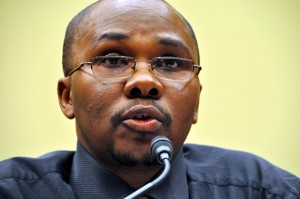
Julius Kaggwa, a leader of the Civil Society Coalition on Human Rights & Constitutional Law (DC Agenda photo by Michael Key)
“It is important that these local, indigenous voices are heard as heavily or as loudly as the international voices,” he said. “We believe that if that voice supplements our own voices, then we will be productive. But if the foreign voices are louder than ours, then I’m afraid that might have a counter-productive effect.”
Johnson said people opposed to the legislation are working to make sure both local and regional voices are heard against the bill, and that Obama could make the local voices stronger.
“I think that could be an aspect in which the administration could be more proactive in terms of talking to other African nations, and talking to the African Union, about making its voice heard on the legislation,” he said.
A number of Democratic U.S. House members spoke out against the bill during the hearing. Rep. Jim McGovern (D-Mass.), co-chairman of the commission, said the bill “is steeped in religious bigotry and homophobia.”
“I want to make it clear that there are many members in this Congress — both Democrat and Republican — who have deep, deep concerns about what’s happening in Uganda and are outraged by this draft legislation,” he said.
Baldwin called the legislation “an extreme and hateful attempt to make people criminals not because of anything they do, but because of who they are and who they love.”
She noted that 90 other U.S. House members joined her in signing a letter to presidents Obama and Museveni, requesting their strong opposition to the legislation.
“I hope that all Ugandans, and particularly those who are [LGBT], will hear the voice of this Congress state very clearly that we will not tolerate these types of human rights violations,” she said.
No Republican member of the commission attended the hearing. A Republican staffer for the commission didn’t immediately respond to DC Agenda’s request to comment on why GOP members were absent.
Federal Government
Lambda Legal praises Biden-Harris administration’s finalized Title IX regulations
New rules to take effect Aug. 1

The Biden-Harris administration’s revised Title IX policy “protects LGBTQ+ students from discrimination and other abuse,” Lambda Legal said in a statement praising the U.S. Department of Education’s issuance of the final rule on Friday.
Slated to take effect on Aug. 1, the new regulations constitute an expansion of the 1972 Title IX civil rights law, which prohibits sex-based discrimination in education programs that receive federal funding.
Pursuant to the U.S. Supreme Court’s ruling in the landmark 2020 Bostock v. Clayton County case, the department’s revised policy clarifies that discrimination on the basis of sexual orientation and gender identity constitutes sex-based discrimination as defined under the law.
“These regulations make it crystal clear that everyone can access schools that are safe, welcoming and that respect their rights,” Education Secretary Miguel Cardona said during a call with reporters on Thursday.
While the new rule does not provide guidance on whether schools must allow transgender students to play on sports teams corresponding with their gender identity to comply with Title IX, the question is addressed in a separate rule proposed by the agency in April.
The administration’s new policy also reverses some Trump-era Title IX rules governing how schools must respond to reports of sexual harassment and sexual assault, which were widely seen as imbalanced in favor of the accused.
Jennifer Klein, the director of the White House Gender Policy Council, said during Thursday’s call that the department sought to strike a balance with respect to these issues, “reaffirming our longstanding commitment to fundamental fairness.”
“We applaud the Biden administration’s action to rescind the legally unsound, cruel, and dangerous sexual harassment and assault rule of the previous administration,” Lambda Legal Nonbinary and Transgender Rights Project Director Sasha Buchert said in the group’s statement on Friday.
“Today’s rule instead appropriately underscores that Title IX’s civil rights protections clearly cover LGBTQ+ students, as well as survivors and pregnant and parenting students across race and gender identity,” she said. “Schools must be places where students can learn and thrive free of harassment, discrimination, and other abuse.”
Michigan
Mich. Democrats spar over LGBTQ-inclusive hate crimes law
Lawmakers disagree on just what kind of statute to pass

Michigan could soon become the latest state to pass an LGBTQ-inclusive hate crime law, but the state’s Democratic lawmakers disagree on just what kind of law they should pass.
Currently, Michigan’s Ethnic Intimidation Act only offers limited protections to victims of crime motivated by their “race, color, religion, gender, or national origin.” Bills proposed by Democratic lawmakers expand the list to include “actual or perceived race, color, religion, gender, sexual orientation, gender identity or expression, ethnicity, physical or mental disability, age, national origin, or association or affiliation with any such individuals.”
Democratic Gov. Gretchen Whitmer and Attorney General Dana Nessel have both advocated for a hate crime law, but house and senate Democrats have each passed different hate crimes packages, and Nessel has blasted both as being too weak.
Under the house proposal that passed last year (House Bill 4474), a first offense would be punishable with a $2,000 fine, up to two years in prison, or both. Penalties double for a second offense, and if a gun or other dangerous weapons is involved, the maximum penalty is six years in prison and a fine of $7,500.
But that proposal stalled when it reached the senate, after far-right news outlets and Fox News reported misinformation that the bill only protected LGBTQ people and would make misgendering a trans person a crime. State Rep. Noah Arbit, the bill’s sponsor, was also made the subject of a recall effort, which ultimately failed.
Arbit submitted a new version of the bill (House Bill 5288) that added sections clarifying that misgendering a person, “intentionally or unintentionally” is not a hate crime, although the latest version (House Bill 5400) of the bill omits this language.
That bill has since stalled in a house committee, in part because the Democrats lost their house majority last November, when two Democratic representatives resigned after being elected mayors. The Democrats regained their house majority last night by winning two special elections.
Meanwhile, the senate passed a different package of hate crime bills sponsored by state Sen. Sylvia Santana (Senate Bill 600) in March that includes much lighter sentences, as well as a clause ensuring that misgendering a person is not a hate crime.
Under the senate bill, if the first offense is only a threat, it would be a misdemeanor punishable by one year in prison and up to $1,000 fine. A subsequent offense or first violent hate crime, including stalking, would be a felony that attracts double the punishment.
Multiple calls and emails from the Washington Blade to both Arbit and Santana requesting comment on the bills for this story went unanswered.
The attorney general’s office sent a statement to the Blade supporting stronger hate crime legislation.
“As a career prosecutor, [Nessel] has seen firsthand how the state’s weak Ethnic Intimidation Act (not updated since the late 1980’s) does not allow for meaningful law enforcement and court intervention before threats become violent and deadly, nor does it consider significant bases for bias. It is our hope that the legislature will pass robust, much-needed updates to this statute,” the statement says.
But Nessel, who has herself been the victim of racially motivated threats, has also blasted all of the bills presented by Democrats as not going far enough.
“Two years is nothing … Why not just give them a parking ticket?” Nessel told Bridge Michigan.
Nessel blames a bizarre alliance far-right and far-left forces that have doomed tougher laws.
“You have this confluence of forces on the far right … this insistence that the First Amendment protects this language, or that the Second Amendment protects the ability to possess firearms under almost any and all circumstances,” Nessel said. “But then you also have the far left that argues basically no one should go to jail or prison for any offense ever.”
The legislature did manage to pass an “institutional desecration” law last year that penalizes hate-motivated vandalism to churches, schools, museums, and community centers, and is LGBTQ-inclusive.
According to data from the U.S. Department of Justice, reported hate crime incidents have been skyrocketing, with attacks motivated by sexual orientation surging by 70 percent from 2020 to 2022, the last year for which data is available.
Twenty-two states, D.C., Puerto Rico, and the U.S. Virgin Islands have passed LGBTQ-inclusive hate crime laws. Another 11 states have hate crime laws that include protections for “sexual orientation” but not “gender identity.”
Michigan Democrats have advanced several key LGBTQ rights priorities since they took unified control of the legislature in 2023. A long-stalled comprehensive anti-discrimination law was passed last year, as did a conversion therapy ban. Last month the legislature updated family law to make surrogacy easier for all couples, including same-sex couples.
A bill to ban the “gay panic” defense has passed the state house and was due for a Senate committee hearing on Wednesday.
Indiana
Drag queen announces run for mayor of Ind. city
Branden Blaettne seeking Fort Wayne’s top office

In a Facebook post Tuesday, a local drag personality announced he was running for the office of mayor once held by the late Fort Wayne Mayor Tom Henry, who died last month just a few months into his fifth term.
Henry was recently diagnosed with late-stage stomach cancer and experienced an emergency that landed him in hospice care. He died shortly after.
WPTA, a local television station, reported that Fort Wayne resident Branden Blaettne, whose drag name is Della Licious, confirmed he filed paperwork to be one of the candidates seeking to finish out the fifth term of the late mayor.
Blaettner, who is a community organizer, told WPTA he doesn’t want to “get Fort Wayne back on track,” but rather keep the momentum started by Henry going while giving a platform to the disenfranchised groups in the community. Blaettner said he doesn’t think his local fame as a drag queen will hold him back.
“It’s easy to have a platform when you wear platform heels,” Blaettner told WPTA. “The status quo has left a lot of people out in the cold — both figuratively and literally,” Blaettner added.

The Indiana Capital Chronicle reported that state Rep. Phil GiaQuinta, who has led the Indiana House Democratic caucus since 2018, has added his name to a growing list of Fort Wayne politicos who want to be the city’s next mayor. A caucus of precinct committee persons will choose the new mayor.
According to the Fort Wayne Journal Gazette, the deadline for residents to file candidacy was 10:30 a.m. on Wednesday. A town hall with the candidates is scheduled for 6 p.m. on Thursday at Franklin School Park. The caucus is set for 10:30 a.m. on April 20 at the Lincoln Financial Event Center at Parkview Field.
At least six candidates so far have announced they will run in the caucus. They include Branden Blaettne, GiaQuinta, City Councilwoman Michelle Chambers, City Councilwoman Sharon Tucker, former city- and county-council candidate Palermo Galindo, and 2023 Democratic primary mayoral candidate Jorge Fernandez.
-

 Africa5 days ago
Africa5 days agoCongolese lawmaker introduces anti-homosexuality bill
-

 District of Columbia1 day ago
District of Columbia1 day agoReenactment of first gay rights picket at White House draws interest of tourists
-

 World5 days ago
World5 days agoOut in the World: LGBTQ news from Europe and Asia
-

 Arizona2 days ago
Arizona2 days agoAriz. governor vetoes anti-transgender, Ten Commandments bill

